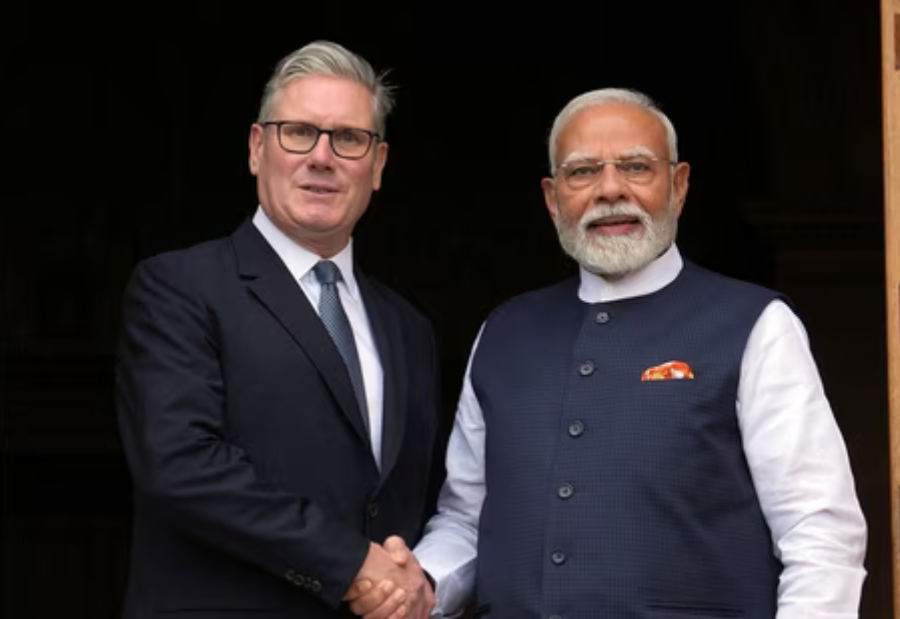India and the UK signed their eagerly anticipated free trade agreement on Thursday, which will increase bilateral commerce by almost $34 billion a year.
In front of Prime Minister Narendra Modi and his British counterpart Keir Starmer, the agreement was formally signed.
According to documents given to reporters by Indian authorities, 99% of Indian exports to the UK would have zero-duty charges removed following the FTA. This includes textiles, leather goods, generic medications and medical devices, and agricultural and chemical items.
Along with increasing the overall trade basket, officials said the arrangement will facilitate the export of vehicles, whisky, and other goods to India by British companies. It’s the biggest trade agreement India has ever signed, and it demonstrates the South Asian country’s readiness to reduce trade restrictions in an effort to attract foreign investment.
The agreement is made at a time when New Delhi is negotiating with important trading partners like the US and the EU, which is using tariff threats to demand increased market access to the most populous country in the world. India will cut 90% of its tariff lines as part of the agreement, and its average duty on UK goods will decrease from 15% to 3%.
The nation will immediately reduce its Scotch whisky tariff by half to 75%, with a ten-year drop to 40%. Additionally, it will consent to a cut in electric vehicle tariffs based on quotas, lowering the headline amount from 110% to 10%.
According to the documents, zero tariffs on textiles and leather are anticipated to increase India’s competitiveness among regional counterparts like Bangladesh and Cambodia, while Indian agriculture products will receive tariff parity with key European exporters like Germany. Within the next two years, India’s leather industry is expected to increase its market share in the UK by 5%, they said.
Exports of electronics and engineering are also predicted to quadruple by 2030, while exports of chemicals may rise by 30% to 40% in the upcoming fiscal year. Additionally, the records stated that exports of gems and jewelry are anticipated to double from the present $941 million over the following three years.
Once the trade agreement is in force, software services exports are predicted to rise by about 20% a year. According to British officials, the agreement may help lower consumer prices.
“Our landmark trade deal with India is a major win for Britain,” Starmer said in the statement. “It will create thousands of British jobs across the UK, unlock new opportunities for businesses and drive growth in every corner of the country.” Nearly £6 billion in “new investment and export wins” for Britain would also be welcomed by Starmer on Thursday, the statement said. According to the premier’s office, as Indian companies grow their operations in the UK, more than 2,200 jobs would be created nationwide.
According to UK authorities, the agreement will eventually boost UK exports to India by about 60%. The UK’s leading services sector will embrace the procurement division, which will enable British companies to bid for federal-level contracts in India. It will also include a chapter on the financial services industry in recognition of the sector’s significance to the UK economy, guaranteeing that domestic suppliers and UK financial services companies are treated equally. A chapter on intellectual property will also be included.
India’s supply of generic medications would not be hampered by the agreement, according to officials who spoke to Bloomberg without identifying themselves, despite earlier concerns that the UK would pressure India to strengthen its intellectual property laws, which might affect its ability to provide affordable pharmaceuticals. The agreement must now be approved by the Indian cabinet and approved by the UK parliament. The two nations are now negotiating a separate bilateral investment treaty.
“This is a watershed moment!! India’s FTA with the UK has been hailed as a shared commitment to strengthening trade in goods and services, boosting investments, and fostering greater cooperation in emerging sectors such as fintech, green energy, and innovation. It reflects a strategic shift towards diversifying its trade and investment relationships,” said Anil Talreja, Partner, Deloitte India.
“This will go a long way to mitigate external shocks while unlocking untapped market potential. This will also enable India and UK to tailor partnership based on complementary strengths—be it in technology, manufacturing, or services. As the global trade order evolves, such bespoke economic partnership will be key to enhancing resilience and driving India’s long-term growth ambitions.”
Also read: Viksit Workforce for a Viksit Bharat
Do Follow: The Mainstream formerly known as CIO News LinkedIn Account | The Mainstream formerly known as CIO News Facebook | The Mainstream formerly known as CIO News Youtube | The Mainstream formerly known as CIO News Twitter |The Mainstream formerly known as CIO News Whatsapp Channel | The Mainstream formerly known as CIO News Instagram
About us:
The Mainstream formerly known as CIO News is a premier platform dedicated to delivering latest news, updates, and insights from the tech industry. With its strong foundation of intellectual property and thought leadership, the platform is well-positioned to stay ahead of the curve and lead conversations about how technology shapes our world. From its early days as CIO News to its rebranding as The Mainstream on November 28, 2024, it has been expanding its global reach, targeting key markets in the Middle East & Africa, ASEAN, the USA, and the UK. The Mainstream is a vision to put technology at the center of every conversation, inspiring professionals and organizations to embrace the future of tech.




